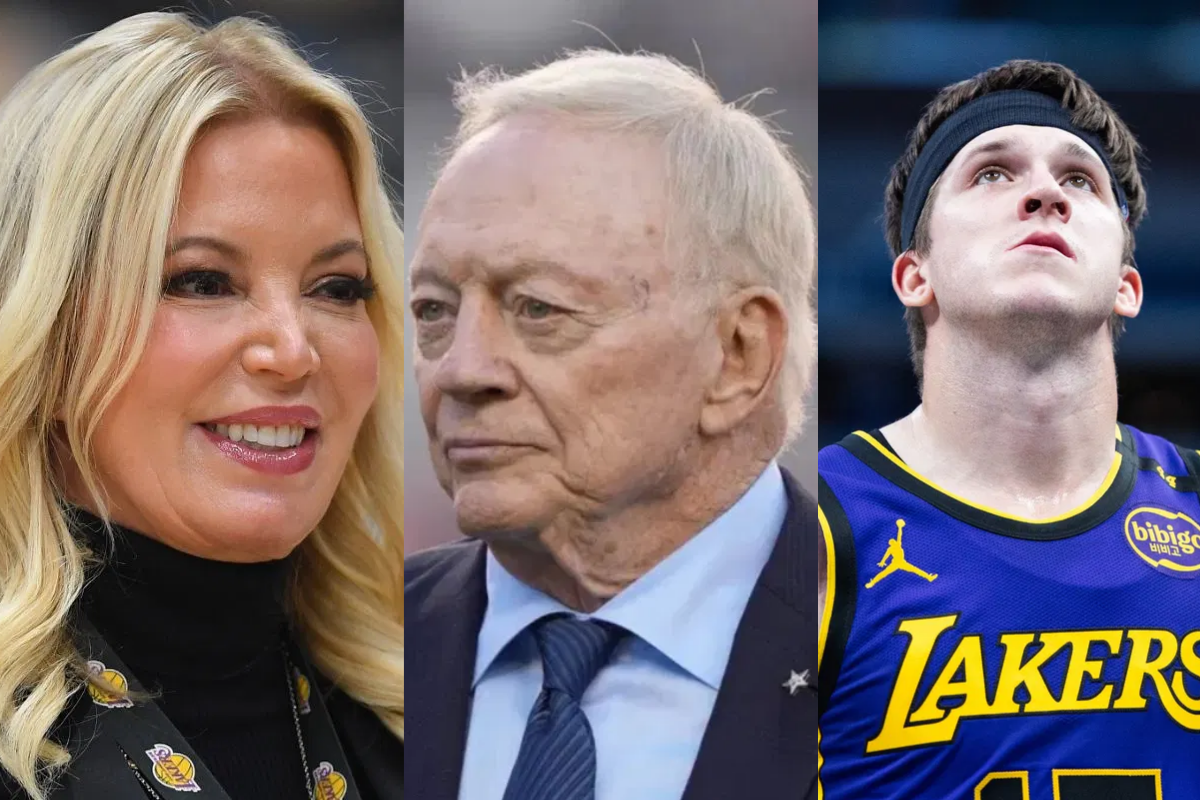
Imago
Credit: Imagn Images

Imago
Credit: Imagn Images
The more you explore the Austin Reaves saga, the more questions you will have about it. The Lakers’ rising star just declined a four-year, $89 million extension. Why? The math was simple. He’d rather wait for a bigger payday in his next contract. While it’s a well-thought financial decision that’s rather common, Reaves’ one is still not very well received. Mostly because it’s a bold move that puts L.A. in a tough spot, and also puts the player on the drawing board with direct comparisons to Dak Prescott’s massive $231 million deal in Dallas—a contract many see as a cautionary tale.
Watch What’s Trending Now!
The debate over Reaves’s value is a fascinating one. On one hand, he’s coming off a career year, averaging over 20.2 points,5.8 assists, 4.5 rebounds and 2.7 made 3-pointers per game while shooting 46% from the field and 38% from beyond the arc. He’s become a fan favorite and a legitimate third option alongside LeBron James and Luka Dončić. On the other hand, as analyst Chris Broussard noted on The Herd, having three players on max or near-max contracts is “untenable,” especially given the Lakers’ other roster needs. Reaves wants to be paid like an “A player,” but Cowherd and others argue he’s a high-level “B player,” and paying him like a superstar could cripple the team’s ability to build a true championship contender.
During a conversation on The Herd with Colin Cowherd on June 27, Cowherd began, “Nothing takes you out of the Championship window in the NBA and NFL, like paying B players A money. Cowboys and Dak Prescott: You’re out of the championship window. Austin Reeves, I’d go to $24 million a year. My take on the Lakers is if you don’t make a move in one year, you’re either paying him 48 [million] or somebody else is paying him 43. [Lakers, you] got to get ahead of this thing and not be the Cowboys.” He then asked, “Am I out of touch? Do you think he’d get 45 million large annually?”
ADVERTISEMENT
Broussard went deeper, explaining the tricky situation the Lakers now find themselves in. “I do agree. I do think next year…assuming he has a season like he had last year… he will get big money on the market,” he said. “Like he will leave the Lakers for big money elsewhere unless LeBron retires after this season and then… he could be the Lakers second guy. But Austin Reeves, as much as I like him… as the second guy on a championship team, I don’t think that’s the case.”
This is where the ghost of Jerry Jones comes in, a cautionary tale that Cowherd laid out perfectly. The Dallas Cowboys owner has been widely criticized for giving quarterback Dak Prescott a massive, market-setting $240 million contract with $231 million guaranteed that hasn’t translated into playoff success. As former NFL QB Chris Simms said on The Dan Patrick Show, “You’re the highest-paid quarterback in the league… I don’t think you’re one of the top 10 quarterbacks in football.”
Cowherd hammered this point home, arguing it’s a classic case of a team overpaying for a very good, but not truly elite, player—a blunder that has left the Cowboys in a state of perpetual disappointment. “Austin’s value on the market because of the contract isn’t quite as much as his production,” Broussard further mentioned talking about a trade, which seems pretty unlikely at this point.
ADVERTISEMENT
For his part, Austin Reaves has made his intentions clear. He wants to be a Laker for life. “I want to be in LA. I want to play my whole career in LA. I love it there,” he said at his youth camp earlier this month. He even revealed that last season was “the most fun I’ve had playing basketball in a long time.” He loves the team, he loves the city, and he loves his new coach, JJ Redick.
But in the cold, hard business of the NBA, loyalty and chemistry often take a backseat to asset management.
ADVERTISEMENT
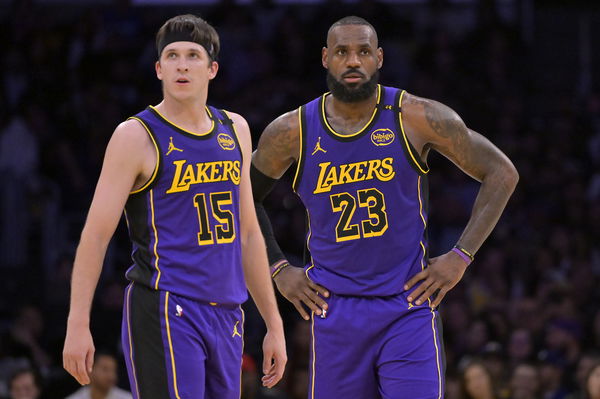
Imago
Jan 17, 2025; Los Angeles, California, USA; Los Angeles Lakers guard Austin Reaves (15) and forward LeBron James (23) talk on the court against the Brooklyn Nets at Crypto.com Arena. Mandatory Credit: Jayne Kamin-Oncea-Imagn Images
Having said that, while the Lakers wrestle with Austin Reaves’s future, their most promising young asset, Dalton Knecht, finds himself caught in the crossfire of the team’s desperate, win-now approach.
ADVERTISEMENT
From Austin Reaves’ contract to Dalton Knecht’s future — a Laker dilemma
The rookie sharpshooter has become the go-to name in nearly every rumored trade package, a clear sign that the Lakers view him less as a long-term building block and more as the price of doing business.
Knecht has already had a chaotic introduction to the business side of the league. After being drafted by the Lakers, he was almost immediately flipped to the Hornets in a deal for center Mark Williams, only to see it rescinded when Williams failed his physical. “It was hard. I got drafted here, so L.A. means a lot,” Knecht said after the bizarre ordeal. “Whatever happens, happens. I’m just going to compete hard wherever I go, and hopefully it’s L.A.” It’s a mature perspective, but unfortunately for him, “whatever happens” seems destined to involve him packing his bags again.
Top Stories
LeBron James Addresses Jeanie Buss Partnership After Explosive Reports on Lakers Leadership Rift

Paige Bueckers Pushes Back on Caitlin Clark Rivalry Talk With Honest Team USA Admission
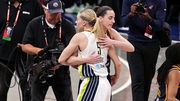
Indiana Fever Makes WNBA Announcement on Caitlin Clark’s 24th Birthday
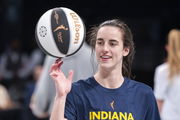
Draymond Green Reveals Jimmy Butler’s Heartbreaking Confession in Warriors Locker Room After ACL Tear
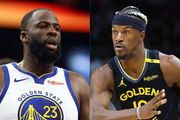
Jonathan Kuminga’s Four-Word Injury Update Sparks Concern as Steve Kerr Confirms MRI
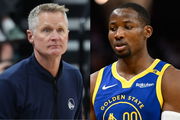
The latest trade rumors, broken down on the Lakers Nation Podcast, center on two potential paths to acquiring a much-needed center, and both run directly through Knecht. The first is a trade for Brooklyn’s Nic Claxton, a deal that would require the Lakers to package Knecht, their valuable 2031 first-round pick, and a handful of role players just to match Claxton’s $25 million salary. The second option floated by ESPN’s Bobby Marks would see the Lakers use Knecht and that same 2031 first-rounder to trade up into the draft to select Duke’s 7-foot-2 center, Khaman Maluach.
ADVERTISEMENT
Both scenarios highlight the same uncomfortable truth: the Lakers are willing to sacrifice a cost-controlled, high-upside shooter to solve their immediate problem at center. The irony, of course, is that while the front office dangles him in trade talks, the team’s current players are actively mentoring him. Austin Reaves recently pegged Knecht as the team’s next breakout player and even shared a story about the rookie pulling him aside to ask for advice on getting more playing time. That’s the kind of locker-room bond that championship teams are built on.
But with a new ownership group and immense pressure on GM Rob Pelinka, the Lakers are clearly in a hurry. They need to win now, while LeBron James is still playing at an elite level. And if that means sacrificing a promising young player like Dalton Knecht, it’s a gamble the front office seems more than willing to take.
ADVERTISEMENT
ADVERTISEMENT
ADVERTISEMENT